Retd Army Capt & His Wife Built NCR’s Oldest & Favourite Tea Café from Their Garage
Retd Army Captain V K Mehra and his wife, Cuckoo, started the Teasta Tea Shop, one of the capital’s oldest and most popular tea cafes, from their garage in Noida in 1995.
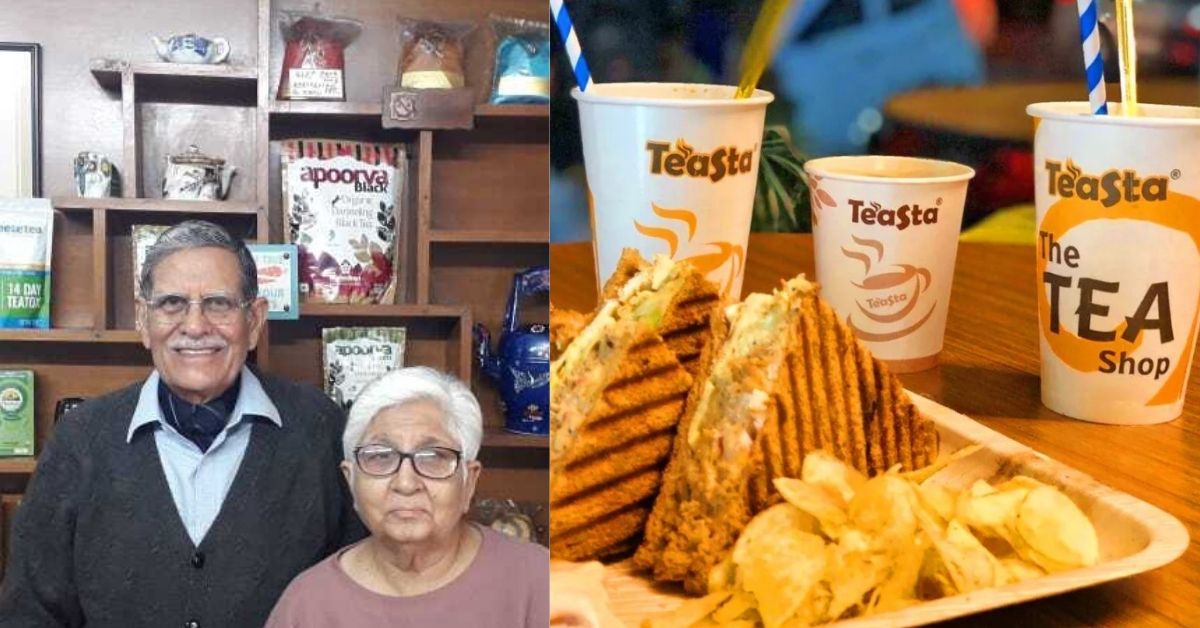
I moved to Noida in 2019, when I started working for the first time. My house was located in one of the many small gullies of Arun Vihar in Sector 37, and was only a stone’s throw away from the infamous ‘tea shop market’. The area has around a dozen eateries that offer a variety of cuisines and is constantly brimming with students, families, and people of all ages. Officially named Godavari Market, the area has lovingly come to be known as the ‘tea shop market’ after the Teasta Tea Shop.
In an unfamiliar city, this tea shop was a safe space. I worked night shifts, so getting a tall glass of freshly brewed tea, and occasionally the hazelnut cold coffee, with a plate of steaming chicken momos every evening before heading for work became a daily ritual for my flatmate and me. When I look back on the two years I spent in the bustling city, visiting the Teasta Tea shop always emerges as the highlight.
Even with the gradual increase in tea rooms and other such cafes in the capital in the last two decades, Teasta’s charm refuses to fade. So how did it all start?
Brewing the perfect cup
Teasta Tea Shop is one of Noida’s, and even NCR’s, oldest tea cafes, started by Captain V K Mehra (78) and his wife, Cuckoo, in 1996. Even today, it remains one of the few such cafes in all of NCR. “I started the tea shop after I retired from the tea gardens of West Bengal. I was the superintendent manager of Rydak tea at Jardine Henderson Ltd, and looked after the tea estates,” Mehra tells The Better India. “I worked there for around 30 years. As I inched towards my retirement, I started mulling over things I could take up.” Prior to working on the tea estates, he had served in the army for about six years with postings in Assam and West Bengal. This was his introduction to manicured tea gardens.
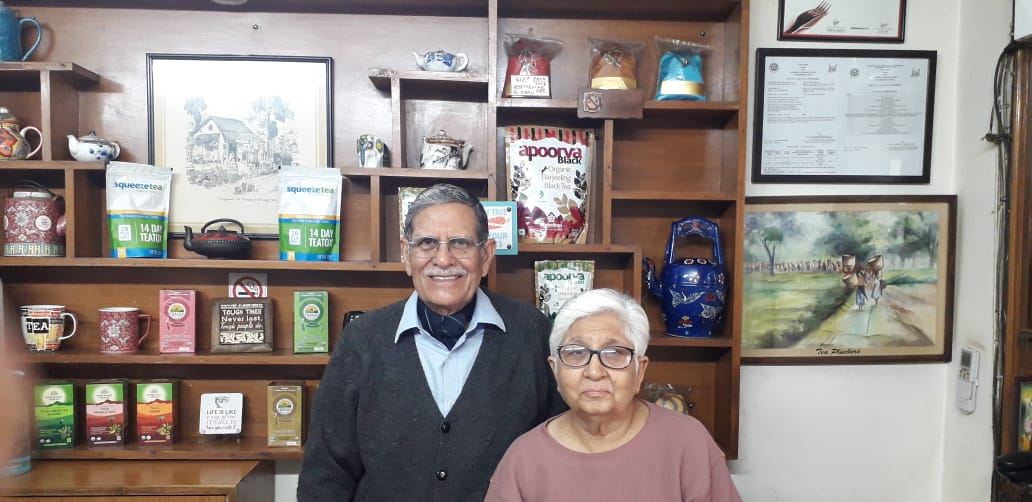
Building a business around tea wasn’t a far fetched idea for Mehra. He was already a tea connoisseur and would go around in army clubs and other areas to give lectures on tea, its benefits, and the right way to brew the perfect cuppa. It is an intricate process, he says, and every step influences the final flavour — right from the conditions in which the leaves are grown to its manufacturing and packaging.
The tea shop began as a small venture started by Cuckoo in Mehra’s garage in 1995. “We began by packing and selling leaves, while he was still in service. He joined a year later,” she says, adding, “Sometimes, customers would come back wanting to know more about how they could brew tea the way we did. When we first started brewing green tea, it was unchartered territory in the capital. We were one of the firsts to introduce it.”
No funny business
The couple worked out of the garage for about eight years, before shifting to Godavari market. While today the area is one of Noida’s favourite places, the situation in the early 2000s was completely different. “There was no other eatery in the area, we were the only ones,” Mehra says. As the tea shop slowly gained popularity and began seeing more and more customers, other aspiring entrepreneurs began taking notice, and most other eateries have only been able to establish themselves as recently as four or five years ago.
Mehra has always commanded a sense of respect from the entire community at Sector 37, which is mostly populated by retired army officers. Even in areas known for hooliganism, Mehra stood as an authoritative and respected figure that the locals listened to. Asked him about what hindrances he faced in setting up the store in the market, he admits they had problems with some of the crowd that would come to the area, but his position in the community prevented them from making dents in what was otherwise a smooth operation.
The shop remains tucked away amidst the dozen other eateries, barely occupying any space. No matter what time of day, it remains the most crowded, with customers constantly flitting in and out carrying tall cups of tea and coffee, and delicious snacks like ham and cheese sandwiches, burgers, momos, muffins, and cookies. The tiny store could barely fit only 10 people at once, counting the cashier and the cooks! Inside, vintage collectables like old kettles, a porcelain teapot, and painted teacups adorn the shelves and counters, with a small couch acting as a waiting area.
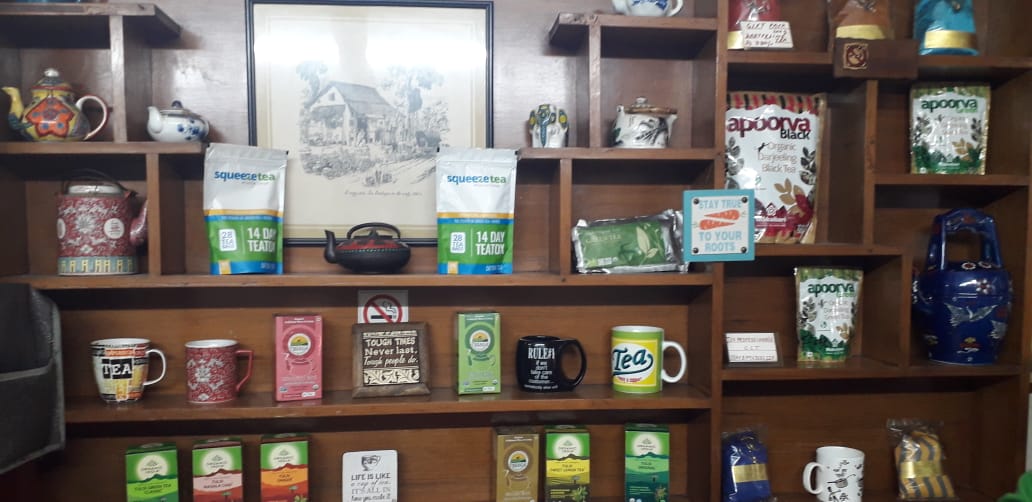
Labour of love
The tea leaves at Teasta Tea are directly procured from the Makaibari Tea Estate in Darjeeling. Mehra makes sure he tastes every sample before picking it up for his cafe. “When we began, our daughters would also pitch in. We would all sit down in the evening after closing shop and calculate the sales of the day on pen and paper. I remember when in the first month our sales were only Rs 1,500,” Mehra laughs. He knew that to build any entrepreneurial venture, patience was key. He adds, “It takes time for a venture to develop, and you can’t expect results immediately. It took us about 7-8 years to break even.”
When it comes to funding, Mehra says that because the garage was his own, he saved a lot on rent. Using their own savings, the couple began with around Rs 40,000 as the initial capital. There are around 12 workers employed with the tea shop as of now. “Things were much cheaper than 25 years ago. We started selling tea at around Rs 6 a glass, and even the cost of tea leaves would be around Rs 100 a kg or so. My total cost of buying the store was also around Rs 9 lakh.”
Before the marketplace became this popular, Mehra says they had enough space to put seating arrangements outside with sigris to keep warm in the winter. “Now, it’s too crowded to do that,” he says. Today, the crowd even spills onto the roads. Diners eat at the tall stone tables outside, the parapet that surrounds the area, inside their cars or on their bikes. Regardless of which cafe they visit, most can be found holding the telling tall yellow and white paper cup, in which all of Teasta’s drinks are served. Mehra’s teas and coffees are a supplement to every meal.
A sense of community
Cuckoo says, “There’s a lot of personal interaction with our customers, especially the younger crowd, which mostly comes from the college nearby. Batches that graduate pass on a word about our cafe to their juniors who then flock here and the cycle repeats.”
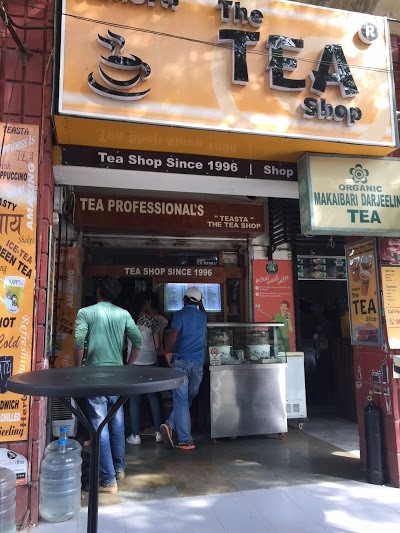
A few years ago, Mehra opened the tea shop’s second outlet in Sector 46. Here, he often holds lectures on the tea manufacturing process, so customers know the kind of work and dedication that goes into brewing a single, steaming cup. He says it’s not always possible for someone to be aware of how the final product came to be, unless they personally visit tea plantations or estates. So he brings these learnings to them instead.
Among the recent big-brand tea cafes that have come up in NCR, what stands out about Teasta is how the shop manages to serve mouth-watering food while staying affordable — the teas and snacks are priced between Rs 40 and Rs 60, but their quality never falters. All teas and coffees are brewed in-house, with less milk, so the flavour of the beans or leaves stands out and the drinks are healthy. Cuckoo bakes the muffins and cookies herself, and the momos are supplied by a third-party vendor. The varieties of tea include Darjeeling, CTC (crush, tear, curl), Kashmiri kahwa, sor-tib-tea, ginseng, jasmine, saffron, among a host of others, totalling up to around 16. Of these, their iced-tea is a fan favourite.
About the significance the cafe holds for loyal customers, Mehra says, “There was once a couple who met here at the tea shop, back in their college days. They fell in love, got married, and settled abroad, but whenever they came back to India, they made it a point to visit the cafe. It was, after all, what brought them together in the first place.” Mehra and his wife love interacting with the youth who come to their store. Speaking of the legacy his heartfelt endeavour has created, he says he is filled with immense happiness when he sees how the community comes together under the ambit of Teasta.
Edited by Yoshita Rao

Similar Story
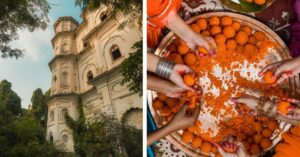
Beyond Bara Imambara: Heritage Photographer Captures Lucknow’s Hidden History
Maroof Umar loves a good story. Whether it is documenting the last calligraphy artist of Lucknow or finding home chefs who cook the best sheer khurma, here’s how he gives the city’s history a fun spin.
Read more >
If you found our stories insightful, informative, or even just enjoyable, we invite you to consider making a voluntary payment to support the work we do at The Better India. Your contribution helps us continue producing quality content that educates, inspires, and drives positive change.
Choose one of the payment options below for your contribution-
By paying for the stories you value, you directly contribute to sustaining our efforts focused on making a difference in the world. Together, let's ensure that impactful stories continue to be told and shared, enriching lives and communities alike.
Thank you for your support. Here are some frequently asked questions you might find helpful to know why you are contributing?


This story made me
-
97
-
121
-
89
-
167












